People who have chinchillas as pets will tell you that they are the best small pets to have. They are cute, fluffy little animals with a thick coat, but this has unfortunately made them a target to some people who hunt them for their thick coats. When you own this precious animal, your life will equally become precious because of their friendliness and playful nature. Unlike other rodents, however, chinchillas need to be put on a very strict diet because they have sensitive stomachs and may easily become ill if fed the wrong type of food. If you are planning to get a chinchilla you need to be 100 percent sure that you are ready to devote your time, energy, and resources to ensure their well-being. Avoid any foods that might cause health issues to your chin.
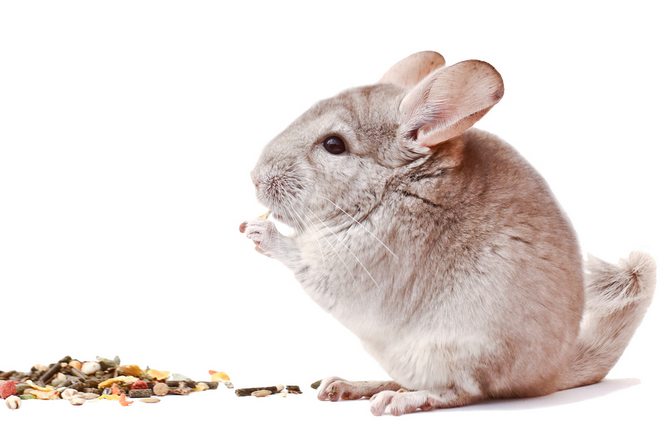
A Guide into Chinchilla Food and Diet
Chinchillas are herbivores meaning that they only eat plant-based food. They also only eat certain types of food for them to remain healthy and happy. There are foods you should avoid giving your chin, but below is a guide on the types of food you can feed to your pet chinchilla.
Loose Feed Mixture

Some chinchilla foods come as a loose mixture, and you should only get ones specially produced for chinchillas. You can feed your pet loose feed mixture occasionally as a treat because it will most likely choose the tastiest pieces and leave the rest and may, therefore, not get all the nutrients it needs. It is best to select mixes that have little amounts of treats and is high in fiber.
Pellets

There are commercially made foods specifically for chinchillas. They are produced in the form of pellets, and they include all the nutrients your chinchilla will need, and you can easily get these pellets from any of the online or local pet stores. It is recommended that you feed the pellets to a chinchilla because this way you are sure it will get the right amounts of protein, fat, and fiber it needs. This is compared to when you feed it with loose mixes which will encourage your chin to pick what it wants from the mix and, therefore, will not get all the nutrients it needs, and this may be hazardous to your pet.
Chinchillas are mostly known to be active early in the morning, and late in the evening, so you need to feed your pet during these times. You need to feed your chinchilla about two tablespoons of pellets in a day by giving it one tablespoon in the morning and one in the evening. It is essential to make sure that the pellets are always available in order to make sure that your chinchilla is well-fed so that it remains healthy.
Foods always expire when they stay around for too long. So, you need to make sure that the pellets have not stayed for more than six months because it will lose most of its nutrients thus damaging the health of your chinchilla.
Hay

Hay is made from dried grass and is an essential meal in your chinchilla’s diet, and you need to provide it with a variety of good quality hay. Chinchillas need to eat grass and hay because chewing it for a long time helps wear down their teeth which grow continuously throughout their life and keep them at the correct length. Eating hay prevents your chinchilla from developing severe dental problems. Hay also contains a high amount of fiber which is excellent for your chinchilla’s digestive health. Hay prevents obesity and diarrhea, and it helps keep your pet occupied through chewing activity.
The hay should always be available, and it should be fresh. You also need to change the hay in your chinchilla’s habitat only when it is soiled in order to prevent the chinchilla from becoming a picky eater, but the change needs to be done on a daily basis.
There are also hay cubes for chinchilla owners who are allergic to hay. The hay cubes do not produce dust, and you can get them online or from pet stores.
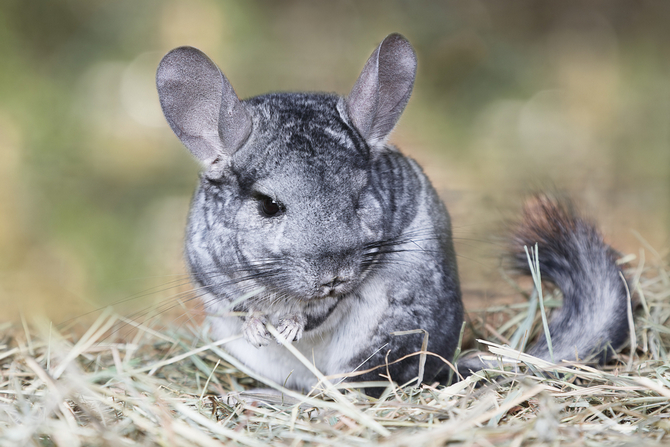
Types of Hay to Feed Your Chinchilla
Timothy hay: It is green, and it comes in three cuts which vary depending on what kind of eater your chinchilla is – whether it is a picky eater or not. It has low amounts of protein and is high in fiber. It’s also very common so finding it will be easy.
Oat hay: It is a good source of fiber and has low protein. You should feed oat hay sparingly because it comes with oat heads. It is brownish in color.
Orchard grass: This is leafy hay and is high in fiber and has low protein. It has green to bluish green leaves depending on its maturity.
Alfalfa hay: This hay is suitable for young, sick, pregnant or nursing chinchillas, but it can also be fed to healthy chins as an occasional treat. It is bright-green, sweet and is highly nutritious.
Water
Your chinchilla must always have clean, fresh water because the pellets and hay do not contain enough of an amount of water. You can get water bottles that are specially designed for chinchillas from the store. Ensure that the bottle is clean and that you change the water daily to prevent a buildup of algae which will cause the water to have a foul taste and develop harmful bacteria; and be sure to check the water levels throughout the day. It is thus recommended that you have two water bottles to make sure that your pet has water even when you are washing the bottle. Your pet should also be able to reach and drink the water without effort. The water aids in the digestion of fiber thus preventing bowel obstructions and toxicity caused by bacteria.
Avoid giving your pet distilled water or water that contains high levels of sodium because the sodium will cause dehydration in your chinchilla. Dehydration will cause your chinchilla to become ill and stop eating, so you need to pay attention to the water you give to your pet.
Dietary Supplements
Dietary supplements are essential in your pet’s diet because it will not get all the nutrients from the regular food. Salt blocks provide essential minerals to your chinchilla although they are not very necessary. You can also add vitamin C supplements to the water your pet is drinking.
If your chinchilla is pregnant, nursing, ill, or less than a year old you can add alfalfa hay to its grass hay diet because it is beneficial due to its higher nutritional value. For healthy chinchillas, only give the hay as treats once in a while. It is recommended that you talk to your vet before giving your pet dietary supplements apart from the alfalfa hay.
Eating Poop
Do not be alarmed when you see your chinchilla eating its own poop. It is normal and healthy for chinchillas to eat their droppings as it provides the necessary nutrients and minerals. Baby chinchillas also eat adult poop because they too need the nutrients.
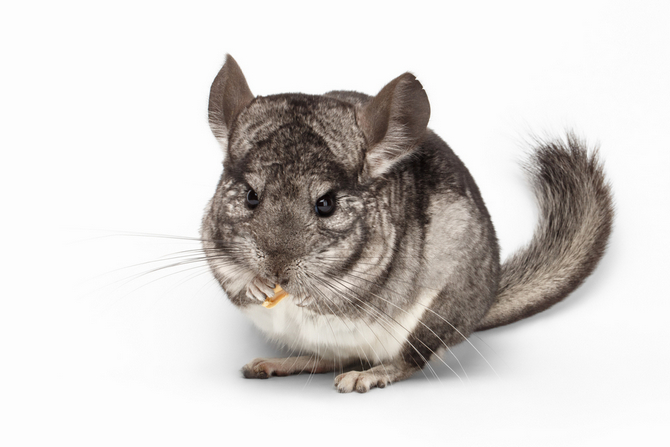
Treats: What Treats Should You Give Your Chin?
Chinchillas are really good at begging to be given treats, but you need to learn to be strict with your pet especially because you don’t want its health to suffer. Treats should only be offered after the chinchilla has eaten its daily food. Do not give it too many treats because the chinchilla may refuse to eat its healthy regular food. The treats may also contain high quantities of certain nutrients which may become harmful to the chinchilla.
Treats that are great for your pet’s diet include hibiscus, dried rose hips, and dandelion leaves. Although chinchillas love dried fruits, seeds, and nuts, you should feed these to them in minimal amounts or don’t feed them at all because chinchillas easily gain weight and they may cause obesity, and high amounts of sugar may lead to digestive problems. Treats will also help you and your chinchilla to interact and develop a strong bond.
Twigs and small branches may not sound like a big deal, but they also make for tasty treats for your pet. You can feed your pet twigs from trees that are safe. Make sure you know which tree twigs are safe for your chinchilla to avoid fatality. The trees should also be free of pesticides and other toxins.
Fruits and Greens

Fresh fruits and vegetables are essential in your pet’s diet. They provide the necessary nutrients and minerals to the chinchilla and also increase its water intake. Make sure to cut the fruits and vegetables into tiny pieces. These should be given occasionally and should not make up more than 10 percent of your pet’s diet. Do not feed your chinchilla any fruits and vegetables if it is not feeling well. Remove the fruits and vegetables from the cage once they stop being fresh.
Pay attention to your pet’s droppings. A healthy chinchilla that eats well every day will pass a lot of dry droppings. A chinchilla that produces little or no droppings is an indication that the pet might be ill and you need to take him to the vet right away.
It is very important that you do not make any sudden changes to your pet’s diet and instead, you should introduce new foods gradually. This will prevent your chinchilla from getting diarrhea and becoming ill due to a shock to their digestive system. Consult your vet if your pet starts showing signs of abnormal behavior when you introduce a new food.
Before you buy any food for your chin make sure it does not contain any artificial flavors or preservatives as this may significantly affect your chinchilla’s health. Remember also to discard food that has not been eaten every day and clean the bowl before refilling it.
Chinchilla Food
Chinchillas originate from dry mountain areas and have adapted to eating dry food. Feeding them food that contains moisture may cause them to become bloated, and this will be fatal since chinchillas cannot pass out gas.
Recommended Dry Foods for Chinchillas
1. Oxbow Animal Health Essentials Deluxe
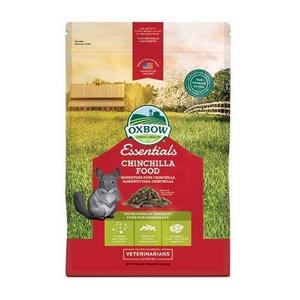
This diet is excellent for your chinchilla as it will help to maintain its health and keep its immunity system strong. It is good for chinchillas of all ages – young chinchilla may be fed unlimited amounts of the pellets in addition to alfalfa and grass hay while older chinchillas may be fed an eighth to a quarter of a cup accompanied by enough grass hay. The food comes in a large bag and will last your pet for some time.
- Contains the required vitamins and minerals
- Includes alfalfa meal high in fiber
- Food for both young and adult chinchillas
2. Higgins Sunburst Gourmet Mix
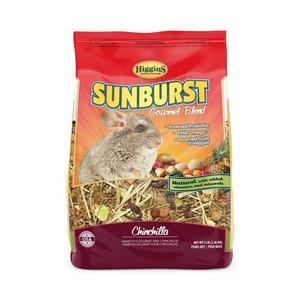
This chinchilla food consists of assorted fruits and vegetables, and it is a food and a treat all in one. It helps to boost your pet’s immunity and promotes a healthy life. The food mix is all natural and does not contain any artificial flavors and preservatives. The mix will bring out your chinchilla’s appetite and promote his foraging instinct.
- Consists of assorted fruits and vegetables
- Contains plant-based DHA omega 3
- Flaked veggies to help in digestion
- Contains protected probiotics to maintain immunity
3. Supreme Petfoods Science Selective
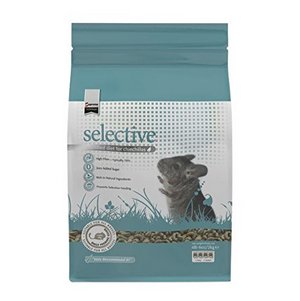
This is a highly balanced nutritional food which is high in fiber. The food is good for your chinchilla as it helps to keep its skin and coat healthy. It is all natural and does not contain artificial colors or added sugar to ensure good dental health for your pet and prevents it from being obese, and it also ensures healthy digestion.
- Contains high levels of fiber to promote digestion
- No added sugar to ensure good dental health
- Low levels of fat to prevent your pet from becoming obese
4. F.M. Brown's Tropical Carnival
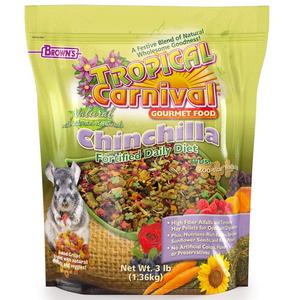
This chinchilla food is not only nutritious but also a delicacy for your fluffy friend. It is great for your chinchilla’s digestive health, and it contains all the food and treats your chinchilla loves to eat which will make it easy for you while feeding your pet.
- High fiber content to ensure healthy digestion
- Fortified with vitamins and nutrients to meet all the dietary needs of your chinchilla
- Consists of food and treats
5. ZuPreem Nature'S Promise
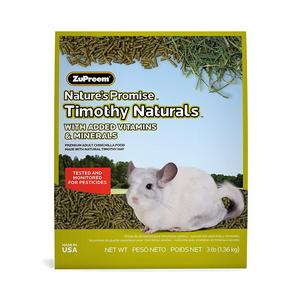
This diet is suitable for adult chinchillas. It is great food for your chinchilla, and it ensures your pet has healthy skin and coat as well as keeping its digestive tract healthy. It does not contain any pesticides or artificial flavors, and your pet will love it.
- High in fiber to ensure your pets healthy digestion
- Made with Timothy Hay
- It includes flaxseeds to promote your pet’s healthy skin and coat.
6. Vitakraft VitaNature – Natural Timothy Formula
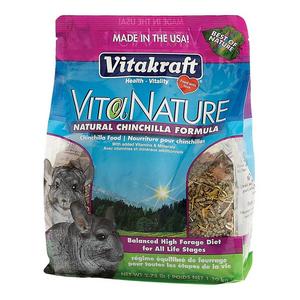
This food will bring out your pet’s foraging instincts and ensures it gets all the nutrients it needs as it contains a variety of ingredients. It also includes flowers, vegetables and greens, natural herbs, berries and is great for boosting your pet’s immunity.
- The diversity of ingredients to bring out your pet’s foraging instincts
- Contains long strand fiber for healthy digestion
- Natural antioxidants to boost immunity
7. Kaytee Fiesta
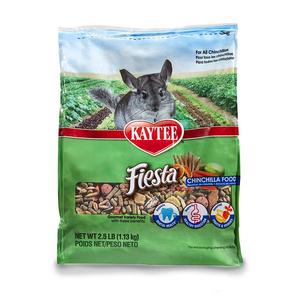
It is crucial that your chinchilla’s dental health is in check and this food is excellent in doing that with its shapes and textures. It has a rich blend of ingredients to ensure your pet gets all the nutrients it needs. It is also great for keeping your pet’s immunity and digestion strong and healthy. The variety of mixes will bring out your chinchilla's foraging instinct.
- It has a variety of ingredients including assorted fruits and vegetables
- Has shapes and textures which promote good dental health
- Contains prebiotics and probiotics for healthy digestion
8. Sherwood Pet Health - Adult Chinchilla Food
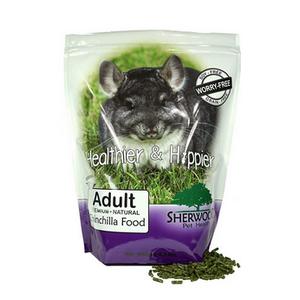
This is a hay-based diet which provides balanced nutrition for your chinchilla. It does not contain any soy and grains to ensure your pet’s digestion remains healthy. It also promotes your pet’s healthy skin and coat. The food is fresh and is free from any artificial flavors or additives and will leave your chinchilla very healthy and energetic.
- Enriched with omega 3 and 6
- Hay-based and it contains flaxseeds to promote healthy digestion
- Fortified with additional nutrients to ensure a healthy chinchilla
9. Kaytee Forti-Diet Pro Health
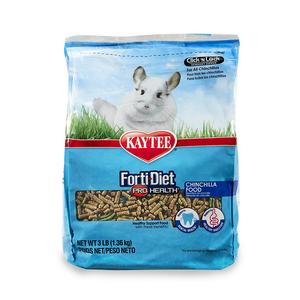
This chinchilla food comes in a re-sealable bag to keep it fresh for your pet. The pieces are large and crunchy to maintain your pet’s dental health, and the prebiotics and probiotics support healthy digestion. It is natural with no added flavors or preservatives making it safe to be consumed by your chinchilla.
- Contains protected prebiotics and probiotics to ensure your pet’s digestive health
- Large crunchy pieces for good dental health
- No artificial flavors and preservatives
- It comes in a re-sealable bag to maintain freshness.
10. Kaytee Timothy Complete
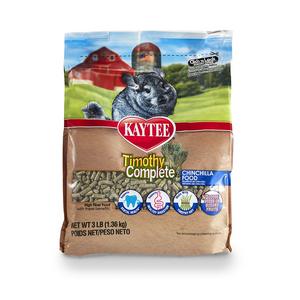
This food helps to keep your chinchilla’s teeth healthy through chewing activity. It is rich in fiber to aid in your pet’s digestion and is made with timothy hay. It has prebiotics and probiotics and does not contain any artificial flavor, color or preservatives, and also does not contain sugary fruits thus lowering the risk of your pet becoming obese.
- It is made with timothy hay to promote dental health
- Naturally preserved to keep it healthy and maintain freshness
- It is rich in fiber to aid in digestion.
Chinchilla treats
You need to be very mindful of the treats you give to your pet. There are certain foods which may seem okay, but which may be harmful to your chinchilla, and you should avoid giving it to them at all costs.
Recommended chinchilla treats
1. Vitakraft Treat Chinchilla Calcium Sticks
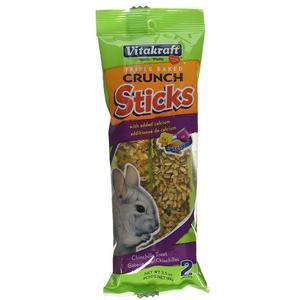
This is a triple-baked crunchy and tasty treat that will provide your pet chinchilla with the calcium it needs for healthy living. The chinchilla will have fun chewing the natural wood stick at the center making this treat good for its dental health, and is also a good way to keep your pet occupied when you’re not around.
- It has a natural chewable wood stick at the center
- Can be clipped to the cage or hung with a wire
- Triple baked to make it tasty and crunchy
- Fortified with calcium and includes two sticks in the package
2. Higgins Sunburst Veggie Stix Gourmet Treats
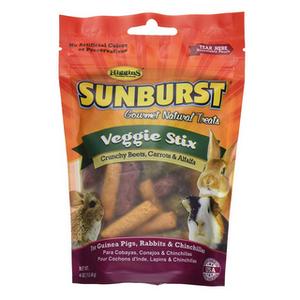
Feed your pet with these tasty sticks made from cooked veggies, sun-cured hay, and grains. It has a high fiber content which is great for your pet’s digestion, and it has a crunchy texture to promote chewing activity. It also promotes your pet’s dental health and is assorted to bring out your chinchilla’s foraging instinct. The treats come in a ziplock bag in order to maintain freshness.
- High in fiber for healthy digestion
- Assorted to encourage foraging
- The treats have a crunchy texture to promote your pet’s chewing activity
3. Kaytee Timothy Hay Baked Apple Treats
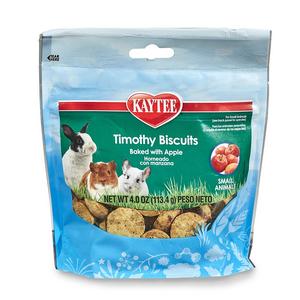
This treat comes as a baked biscuit and is made from timothy hay. It is great for your pet since it promotes digestion as well as dental health. The treat also promotes chewing activity, and it is easy to feed your pet with it. It is good for keeping your pet occupied, and it has no added flavors or preservatives making it a healthy treat.
- Made from timothy hay which is a source of fiber to promote digestion
- No artificial flavors or added preservatives
- The treat contains multiple ingredients to add nutritional value.
Bottom Line
Feeding your chinchilla will not be a hard task for you if you follow the diet as required. You should not assume that your chinchilla is just like any other rodent and feed it what you would feed your guinea pig or rabbit. Also, remember to take it to the vet whenever it does not show normal behavior. Treat it as you would treat your child who is allergic to most food and needs to be monitored closely, and this will ensure your pet lives a long, comfortable, healthy life away from its natural habitat.